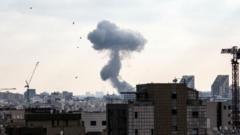While turnout for the demonstrations was lower than previous protests, many participants expressed opposition to both U.S. military involvement and the Iranian government, calling for peaceful change in the region.
Public Outcry Surges Against U.S. Military Actions in Iran

Public Outcry Surges Against U.S. Military Actions in Iran
A series of protests erupted across multiple U.S. cities over the weekend, reflecting widespread disapproval of the Trump administration's recent airstrikes in Iran.
Protests erupted in various U.S. cities this past weekend as citizens gathered in response to the Trump administration's airstrikes on Iran, showcasing a mixture of discontent toward both the U.S. military involvement and the Iranian leadership.
On Sunday, multiple demonstrations took place in major cities such as New York, Washington, D.C., Chicago, and Los Angeles, with crowd sizes ranging from hundreds to dozens. The protests, described by organizers as "emergency mobilizations," were relatively organized late Saturday in response to recent events.
Demonstrators in Washington D.C. gathered outside the White House, where around 200 individuals, including veterans, voiced their frustration over the airstrikes and condemned the President's militaristic stance. Ron Carmichael, a Korean War veteran, denounced his approach, suggesting it represented a move towards autocratic governance.
In Chicago, a similar crowd of over 200 participated, giving voice to the sentiments of those with ties to Iran. Ali Tarokh, an immigrant from Iran, remarked on the tragic implications of the airstrikes, expressing belief in peaceful reform over violent regime change. He echoed a shared sentiment that U.S. military efforts often complicate the prospects for democracy in Iran.
Protesters articulated concerns regarding the fallout of escalating tensions with Iran, linking it to the ongoing humanitarian crisis faced by Palestinians in Gaza. Noor Abdel-Haq, a nurse from Los Angeles with family ties in the region, emphasized the need to avoid further violence, stating, “We don’t want more murder and destruction.”
In Richmond, Virginia, Violeta Vega, a community leader, led a small gathering that highlighted a broader message of prioritizing social needs over war. Despite the heat, she expressed pride in their unified effort to call for peace, asserting the importance of such demonstrations in advocating for constructive change.
While participation was notably lower than the previous weekend's “No Kings” protests that rallied across all 50 states, the recent wave of demonstrations served as a crucial moment for anti-war activists to voice their opposition amidst evolving geopolitical tensions.





















